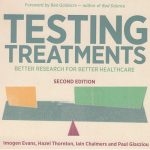
What are fair tests of treatments?
Not all is created equal: some tests of s are more reliable than others. Sometimes tests of treatments can be […]
| 0 Comments
What can be done to improve tests of treatments?
We can all play a part in ensuring that treatment decisions are based on fair tests of treatments. This will […]
| 0 Comments
Linguistic strategies for improving informed consent in clinical trials among low health literacy patients
Evidence-based guidance on how to improve informed consent processes for patients being invited to participate in clinical research.
| 0 Comments | Evaluated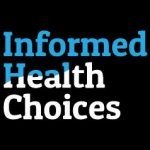
Informed Health Choices Podcasts
Each episode includes a short story with an example of a treatment claim and a simple explanation of a Key Concept used to assess that claim
| 1 Comment | Evaluated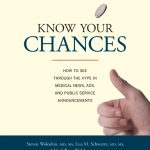
Know Your Chances
This book has been shown in two randomized trials to improve peoples' understanding of risk in the context of health care choices.
| 0 Comments | Evaluated
Evidence for everyday health choices
A 17-min slide cast by Lynda Ware, on the history of EBM, what Cochrane is, and how to understand the real evidence behind the headlines.
| 0 Comments
Sunn Skepsis
Denne portalen er ment å gi deg som pasient råd om kvalitetskriterier for helseinformasjon og tilgang til forskningsbasert informasjon.
| 0 Comments
Dancing statistics: Explaining variance
A 5-minute film demonstrating the statistical concept of variance through dance.
| 0 Comments
Dancing statistics: sampling & standard error
A 5-minute film demonstrating the statistical concept of sampling and standard error through dance.
| 0 Comments
Julia Belluz – Lessons from the trenches of evidence-based health journalism at Vox.com
20-minute talk by Julia Belluz on the need to bring the cultures of health journalism and EBM together.
| 0 Comments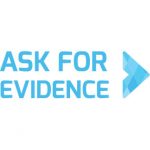
Don’t jump to conclusions, #Ask for Evidence
An introduction to the ‘Ask for Evidence’ initiative launched by ‘Sense about Science’ in 2016.
| 0 Comments

The surrogate battle – is lower always better?
James McCormick recruits a furious Fuhrer to point out that taking drugs to lower surrogate measures of ill health is a confidence trick.
| 0 Comments
Tom Hanks and Type 2 Diabetes
A 50-minute illustrated talk by James McCormack prompted by Tom Hanks’ announcement that he had been diagnosed with Type 2 diabetes.
| 0 Comments
Bohemian Polypharmacy
James McCormack recruits help from Queen to warn of the dangers of ‘Bohemian Polypharmacy’ in music.
| 0 Comments
Choosing Wisely
James McCormack using song and dance to warn about the negative effects of overtreatment.
| 0 Comments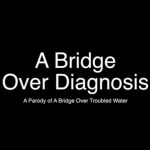
Like a bridge overdiagnosis
James McCormack with another of his brilliant parodies, warning about the dangers of becoming inappropriately labelled as ill.
| 0 Comments
Reporting the findings: Absolute vs relative risk
Absolute Differences between the effects of two treatments matter more to most people than Relative Differences.
| 0 Comments
Explaining the mission of the AllTrials Campaign (TED talk)
Half the clinical trials of medicines we use haven’t been published. Síle Lane shows how the AllTrials Campaign is addressing this scandal.
| 0 Comments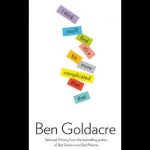
Fish oil in the Observer: the return of a $2bn friend
Ben Goldacre draws attention to people’s wish to believe that a pill can be the solution to a complicated problem.
| 0 Comments
Building evidence into education
Ben Goldacre explains why appropriate infrastructure is need to do clinical trials of sufficient rigour and size to yield reliable results.
| 0 Comments
Anecdotes are great – if they convey data accurately
Ben Goldacre gives examples of how conclusions based on anecdotes and biased research can be damagingly misleading.
| 0 Comments
Studies of studies show that we get things wrong
Ben Goldacre gives examples of how conclusions based on anecdotes and biased research can be damagingly misleading.
| 0 Comments
Dodgy academic PR
Ben Goldacre: 58% of all press releases by academic institutions lacked relevant cautions and caveats about the methods and results reported
| 0 Comments
All bow before the mighty power of the nocebo effect
Ben Goldacre discusses nocebo effects, through which unpleasant symptoms are induced by negative expectations, despite no physical cause.
| 0 Comments
How do you regulate Wu?
Ben Goldacre finds that students of Chinese medicine are taught (on a science degree) that the spleen is “the root of post-heaven essence”.
| 0 Comments
Science is about embracing your knockers
Ben Goldacre: “I don’t trust claims without evidence, especially not unlikely ones about a magic cream that makes your breasts expand.”
| 0 Comments
NMT are suing Dr Wilmshurst. So how trustworthy are this company? Let’s look at their website…
Ben Goldacre celebrates Peter Wilmshurst, the doctor who blew the whistle on research misconduct in a study to which he was a contributor.
| 0 Comments
Over there! An 8 mile high distraction made of posh chocolate!
Ben Goldcare illustrates strategies used by vested interests to discredit research with ‘inconvenient’ results.
| 0 Comments
Brain imaging studies report more positive findings than their numbers can support. This is fishy.
Ben Goldacre explores how twice as many positive findings as could realistically have been expected from the data reported may have occurred
| 0 Comments
What if academics were as dumb as quacks with statistics?
Ben Goldacre introduces a statistical error that appears in about half of all the published papers in academic neuroscience research.
| 0 Comments
The strange case of the magnetic wine
Ben Goldacre shows how claims for the wine-maturing effects of magnets could be assessed with 50 people in an evening.
| 0 Comments
Screen test
Ben Goldacre notes that even if people realize that screening programmes have downsides, people don’t regret being screened.
| 0 Comments
Sampling error, the unspoken issue behind small number changes in the news
Ben Goldacre stresses the importance of taking account of “sampling variability” and confidence intervals.
| 0 Comments
The certainty of chance
Ben Goldacre reminds readers how associations may simply reflect the play of chance, and describes Deming’s illustration of this.
| 0 Comments
Publish or be damned
Ben Goldacre points out the indefensible practice of announcing conclusions from research studies which haven’t been published.
| 0 Comments
How myths are made
Ben Goldacre draws attention to Steven Greenberg’s forensically based illustration of citation biases.
| 0 Comments
Foreign substances in your precious bodily fluids
Ben Goldacre points out that there is no evidence giving strong support either to water fluoridationists or to anti-fluoridationists.
| 0 Comments
Is it okay to ignore results from people you don’t trust?
Ben Goldacre: why it’s important to consider vested interests when judging research, but not to dismiss research by people you don’t like.
| 0 Comments
Cherry picking is bad. At least warn us when you do it.
Ben Goldacre illustrates how biased ‘cherry picking’ and choosing from the relevant evidence can result in unreliable conclusions.
| 0 Comments
Why won’t Professor Susan Greenfield publish this theory in a scientific journal?
Ben Goldacre challenges senior Oxford professor to publish the evidence supporting her claim that computer games cause dementia in children.
| 0 Comments
Weasels Are on the Loose
Weaseling is the use of certain words to weaken a claim, so that the author can say something without actually saying it and avoid criticism
| 0 Comments
Introduction to Evidence-Based Medicine
Bill Caley’s 26 slides with notes used as an ‘Introduction to Evidence-Based Medicine’.
| 0 Comments
The power of the placebo effect
Emma Bryce’s video presents information about placebo effects: treatments not supposed to have an effect but which make people feel better.
| 0 Comments
Not all scientific studies are created equally
David Schwartz dissects two types of studies that scientists use, illuminating why you should always approach claims with a critical eye.
| 1 Comment
Taking account of the play of chance
Differences in outcome events in treatment comparisons may reflect only the play of chance. Increased numbers of events reduces this problem
| 0 Comments
Quantifying uncertainty in treatment comparisons
Small studies in which few outcome events occur are usually not informative and the results are sometimes seriously misleading.
| 0 Comments
Bringing it all together for the benefit of patients and the public
Improving reports of research and up-to-date systematic reviews of reliable studies are essential foundations of effective health care.
| 0 Comments
Tipsheet for reporting on drugs, devices and medical technologies
Questions that will be familiar to reporters covering health and medicine.
| 0 Comments
Tips for understanding Intention-to-Treat analysis
Ignoring non-compliance with assigned treatments leads to biased estimates of treatment effects. ITT analysis reduces these biases.
| 0 Comments
Tips for understanding Absolute vs. Relative Risk
Absolute Differences between the effects of two treatments matter more to most people than Relative Differences.
| 0 Comments
Tips for understanding Non-inferiority Trials
A non-inferiority experiment endeavours to show that a new intervention is ‘not unacceptably worse’ than the comparison intervention.
| 0 Comments
Cyagen is paying for citations
Pharmaceutical company Cyagen offers researchers and other writers $100 or more for citing their products in publications.
| 0 Comments
GenerationR – The importance of involving children and young people in research
3/3, 22-min video at the launch of GenerationR, a network of young people who advise researchers.
| 0 Comments
Generation R – The need to reduce waste in clinical research involving children
1/3, 14-min video at the launch of GenerationR, a network of young people who advise researchers.
| 0 Comments
Making sense of randomized trials
A description of how clinical trials are constructed and analysed to ensure they provide fair comparisons of treatments.
| 0 Comments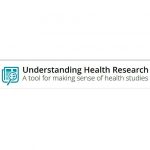
Common Sources of Bias
Bias (the conscious or unconscious influencing of a study and its results) can occur in different ways and renders studies less dependable.
| 0 Comments
5 reasons why you might not get the best healthcare
Five reasons why patients may not always get the best care available.
| 0 Comments
Tamiflu: securing access to medical research data
A campaign by researchers has shown that Roche spun the research on Tamiflu to meet their commercial ends.
| 0 Comments
MMR: the facts in the case of Dr Andrew Wakefield
This 15-page cartoon explains the events surrounding the MMR controversy, and provides links to the relevant evidence.
| 5 Comments
Los intervalos de confianza en investigación
¿Para qué sirven los intervalos de confianza en los estudios de investigación?
| 0 Comments

Toma de Decisiones Compartidas
¿Por qué nosotros, los pacientes, debemos participar en la toma de decisiones médicas importantes?
| 0 Comments

The need to compare like-with-like in treatment comparisons
Allocation bias results when trials fail to ensure that, apart from the treatments being compared, ‘like will be compared with like'.
| 0 Comments
Why avoiding differences between treatments allocated and treatments received is important
Knowledge of which treatments have been received by which study participants can affect adherence to assigned treatments and result in bias.
| 0 Comments
The need to avoid differences in the way treatment outcomes are assessed
Biased treatment outcome assessment can result if people know which participants have received which treatments.
| 0 Comments
Avoiding biased selection from the available evidence
Systematic reviews are used to identify, evaluate and summarize all the evidence relevant to addressing a particular question.
| 0 Comments
Preparing and maintaining systematic reviews of all the relevant evidence
Unbiased, up-to-date systematic reviews of all the relevant, reliable evidence are needed to inform practice and policy.
| 0 Comments
Dealing with biased reporting of the available evidence
Biased reporting of research occurs when the direction or statistical significance of results influences how research is reported.
| 0 Comments
Using the results of up-to-date systematic reviews of research
Trustworthy evidence from research is necessary, but not sufficient, to improve the quality of health care.
| 0 Comments
Why treatment comparisons must be fair
Fair treatment comparisons avoid biases and reduce the effects of the play of chance.
| 0 Comments
Introduction to JLL Explanatory Essays
Professionals sometimes harm patients by using inadequately evaluated treatments. Research addressing uncertainties can reduce this harm.
| 0 Comments
Avoiding biased treatment comparisons
Biases in tests of treatments are those factors that can lead to conclusions that are systematically different from the truth.
| 0 Comments
Bias introduced after looking at study results
Biases can be introduced when knowledge of the results of studies influences analysis and reporting decisions.
| 0 Comments
Reducing biases in judging unanticipated effects of treatments
As with anticipated effects of treatments, biases and the play of chance must be reduced in assessing suspected unanticipated effects.
| 0 Comments
Recognizing researcher/sponsor biases and fraud
The vested interests of researchers and organizations tend to be reflected in reports of treatment research in which they are involved.
| 0 Comments
Video games and health improvement: a literature review of randomized controlled trials
This is a critical appraisal of a non-systematic review of randomized trials of video games for improving health.
| 0 Comments
Why comparisons must address genuine uncertainties
Too much research is done when there are no genuine uncertainties about treatment effects. This is unethical, unscientific, and wasteful.
| 0 Comments
Surrogate markers may not tell the whole story
A webpage explaining the limitations of using surrogate outcome markers in clinical research.
| 0 Comments
Why treatment comparisons are essential
Formal comparisons are required to assess treatment effects and to take account of the natural course of health problems.
| 0 Comments
Why treatment uncertainties should be addressed
Ignoring uncertainties about the effects of treatments has led to avoidable suffering and deaths.
| 0 Comments
Motivational Deficiency Disorder – a satirical look at disease mongering
Ray Moynihan’s 4-min video on ‘Motivational Deficiency Disorder’, illustrating ‘disease-mongering’.
| 0 Comments
Making Sense of Screening
Screening tests can cause harm. This guide helps you to make sense of claims about screening for health conditions.
| 0 Comments
What are systematic reviews?
A 3-min video by Jack Nunn and The Cochrane Consumers and Communication group for people unfamiliar with the concept of systematic reviews.
| 0 Comments
Interactive PowerPoint Presentation about Clinical Trials
An interactive Powerpoint presentation for people thinking about participating in a clinical trial or interested in learning about them.
| 0 Comments
Testing Treatments
Testing Treatments is a book to help the public understand why fair tests of treatments are needed, what they are, and how to use them.
| 0 Comments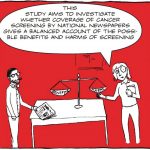
Annals Graphic Medicine: How screening is portrayed in the media
A cartoon series addressing the theme "Earlier is not necessarily better".
| 0 Comments
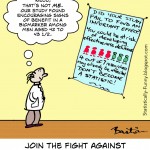
Effectiveness Delusions
Cherry picking the results of people in sub-groups can be misleading.
| 0 Comments
Cecil and those pellets again…
If possible, participants in clinical trials should not know which treatment they are receiving.
| 0 Comments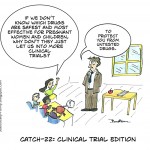
Catch 22 – clinical trials edition
Fair comparisons of treatments in animals or highly selected groups of people may not be relevant.
| 0 Comments
House Calls Please
Beware reliance on 'experience' without reference to relevant evidence.
| 0 Comments
Composite Outcomes
Fair comparisons of treatments should measure important outcomes and avoid dependence on surrogate outcome measures.
| 0 Comments
Biomarkers unlimited
Fair comparisons of treatments should measure important outcomes and avoid dependence on surrogate outcome measures.
| 0 Comments
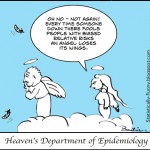
Department of Epidemiology
Presenting relative measures of treatment effects without presenting absolute measures can be misleading.
| 0 Comments
Goldilocks
Cartoon and blog about how poorly performed systematic reviews and meta-analyses may misrepresent the truth.
| 0 Comments
House of tottering cards
Poorly performed systematic reviews and meta-analyses may misrepresent the truth.
| 0 Comments
Cherry Picking
Cherry-picking results that only support your own conclusion may mean ignoring important evidence that refutes a treatment claim.
| 0 Comments

Secret life of trials
The results of single comparisons of treatments can be misleading.
| 0 Comments

Desert Island Medical Journal
Small studies with few outcome events are usually not informative and can be misleading.
| 0 Comments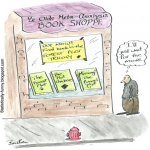
Forest Plot Trilogy
Synthesising the results of similar but separate fair comparisons (meta-analysis) may help by yielding statistically more reliable estimates
| 0 Comments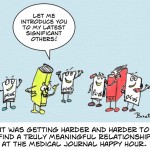
Significant Others
Statistical significance does not always mean meaningful or practical significance.
| 0 Comments
False Precision
The use of p-values to indicate the probability of something occurring by chance may be misleading.
| 0 Comments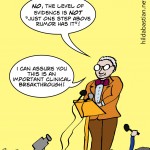

Personal “No Worse”
People with vested interests may use misleading statistics to support claims about the effects of new treatments.
| 0 Comments

Lisa luxuriant hair
If possible, participants in clinical trials should not know which treatment they are receiving.
| 0 Comments
Suzie in despair
Apart from the treatments being compared, the comparison groups need to be similar.
| 0 Comments
World without bias
Overcoming biases is difficult but important. Treatment comparisons must be fair.
| 0 Comments
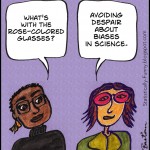
Avoid despair about biases
People who choose to ignore biases may do themselves and others harm.
| 0 Comments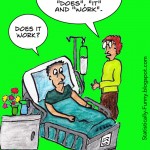
Does it work?
People with vested interests may use misleading statistics to support claims about the efects of new treatments.
| 0 Comments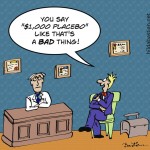
Thousand dollar placebo
People with vested interests may take advantage of peoples' fears or hopes..
| 0 Comments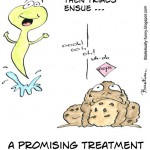
Promising treatments
'Promising' treatments greatly outnumber actual advances in treatment.
| 0 Comments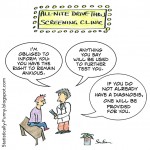
Right to remain anxious
Earlier testing is not always better, and can lead to overdiagnosis, overtreatment and anxiety.
| 0 Comments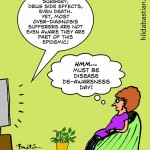
De-awareness day
Earlier testing is not always better, and can lead to overdiagnosis and overtreatment.
| 0 Comments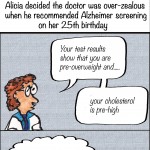
Alicia
Earlier testing is not always better, and can lead to overdiagnosis and overtreatment.
| 0 Comments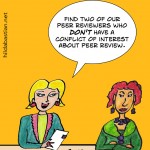
Peer-Review
Even quality control steps, such as peer-review, can be affected by conflicts of interest.
| 0 Comments
Gertrud
Exaggeration and hopes or fears can lead to unrealistic expectations about treatment effects.
| 0 Comments
